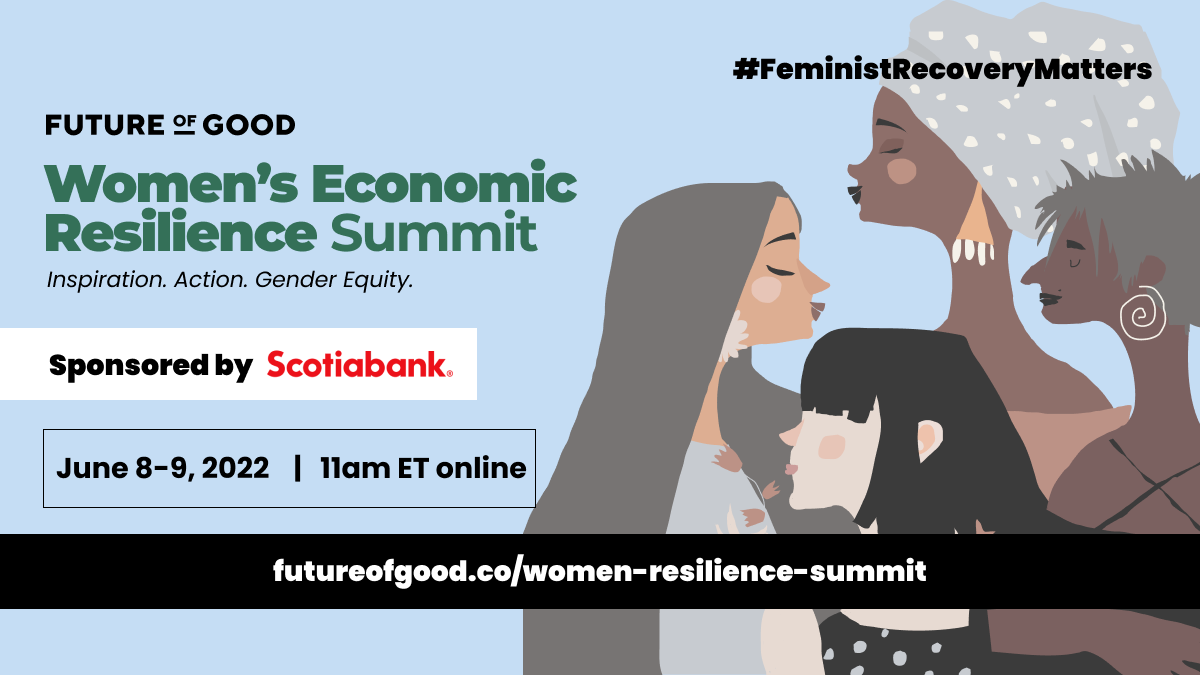Group tickets: 2022 Women's Economic Resilience Summit

The Future of Good Women’s Economic Resilience summit, presented by Scotiabank, will convene changemakers and speakers working to advance gender equity and economic empowerment from across Canada and around the world. We’ll dive into feminist philanthropy, feminist movements, feminist public policy, entrepreneurship, care, leadership, and a whole lot more.
We designed this event so your group, team or organization can learn what others have already figured out.
Group tickets include one year of Future of Good membership, to support ongoing growth and development, through all-access to our content, events and community.
Every week through our membership program, we equip thousands of changemakers with news, analysis and actionable insights that help them stay current, stay knowledgeable, and flourish in a new era of impact.
Join hundreds of organizations from across Canada’s social impact sector for conversations, learnings and connections you can’t get anywhere else.
GROUP TICKETS
All team plans include access to summit and one year of Future of Good team membership. Find out more about team plans here.
Have questions? Email jenna@futureofgood.co.
Future of Good has created accessible pricing for small grassroots, volunteer lead organizations with financial constraints. Grassroots, volunteer lead or underfunded organizations serving women and LGBTQI2S+ can self identify for this five person plan at $150 + tax, annually. For more information on this plan please click here.
Interested in a group plan? Fill out the form below and we’ll get back to you!
Interested in a group plan? Contact us today!
WHAT PEOPLE HAVE SAID
About the event
Women and gender-expansive people have rich histories of resilience in the face of oppression and exclusion.
We’ve seen these communities — particularly women of colour, queer, trans, and non-binary people, disabled women, and Indigenous women — have to pull from wells of resilience throughout the pandemic.
What if they didn’t have to? How might policymakers and social purpose organizations build economic systems that work for women and gender-expansive people?
The Future of Good Women’s Economic Resilience summit, sponsored by Scotiabank, will convene changemakers and speakers working to advance gender equity and economic empowerment from across Canada and around the world. We’ll dive into feminist philanthropy, feminist movements, feminist public policy, entrepreneurship, care, leadership, and a whole lot more.
Hosted by Future of Good’s editorial fellow on women’s economic resilience, Sherlyn Assam, we’ll ask tough questions about whether the social purpose sector offers decent work for its 80 per cent women workforce. We’ll ask, too, about whether social policy development in this country is feminist and inclusive; how teams and organizations are driving gender equity; how funders might reckon with the trauma many women experience with money; and more.
We’ll also spotlight solutions led by women and non-binary people — from feminist activists on the frontlines of movements globally to women’s traditions of community care to the entrepreneurs, investors, and philanthropists building a better future for their communities every day.
Summit Themes
Celebrating the rich history of women and non-binary people’s traditions of reciprocity. From giving circles to networks of mutual aid to communal childcare, what are the practices women and gender-expansive people have built for their own economic resilience? How might the more formal or institutional world of social impact learn from and support these practices? What does it mean to embed feminist concepts of reciprocity into policies, programs, funding, etc. for women’s economic resilience?
Capital — and lots of it — will be required to make strides on gender equity and economic resilience among women and non-binary people. What does it mean to make this funding feminist? What kind of funding works best for organizations and initiatives advancing women’s economic resilience? How can funders better understand issues that women and non-binary people face? What does it mean to reckon with the trauma that money has caused for many women — particularly Indigenous and racialized women — and make funding processes safe for them?
What kind of social policy processes fosters — and impedes — economic resilience for women and gender-expansive people? In what ways have social policy development processes and interventions in response to COVID left women and (perhaps especially) non-binary people behind. How well has the federal government’s gender-based analysis fared? What do feminist approaches to policymaking look like?
Women make up 80 percent of the non-profit workforce, but are underrepresented — particularly racialized, Indigenous, disabled, trans, and otherwise marginalized women — in high-paid and leadership positions. Let’s unpack pay disparities, precarious work, the lack of women in leadership roles, lack of gender equity in governance, and generally what it means that social purpose and care work have been historically feminized and therefore marginalized — as has been especially evident through the pandemic.
Feminist activists and grassroots groups around the world are fighting for fairer economic systems every day, and are connected directly to the issues the most marginalized women and non-binary communities face. What can organizations and institutions learn from them? What are the biggest issues preventing women’s economic resilience, and what are the activist strategies that work in the fight for justice?
There’s been much talk of a ‘she-cession’ through the pandemic — and much talk, too, of what makes for an inclusive, feminist recovery. Let’s bring together some key themes that make up this summit — policy, community care, funding, and more — and discuss what the social impact world needs to do now to advance gender equity in organizations, and make sure women and non-binary people aren’t still struggling to recover economically from the crisis years down the line.
JOIN the conversation using #FeministRecoveryMatters
For more information on speakers, agenda, partners, or to purchase individual tickets, click here.
